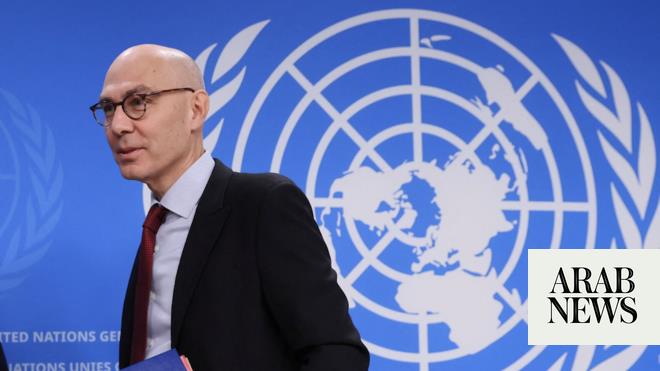
High Commissioner for Human Rights Zeid Raad al-Hussein condemned on Monday the Syrian regime’s “pervasive war crimes” in Eastern Ghouta as 15 children were killed in the latest air strikes on the besieged enclave.
He told an informal meeting of the United Nations Security Council that the regime’s five-year siege of of Eastern Ghouta has involved the use of chemical weapons and starvation as a weapon of war, decrying "mind-numbing crimes" committed by all parties in Syria using "unlawful methods of warfare."
Zeid said this has culminated "in the current relentless, month-long bombardment of hundreds of thousands of terrified trapped civilians."
"Families are now streaming out of the area," he said, "but many civilians fear reprisals will be taken against them for their perceived support for opposition groups."
He said multiple parties to the conflict, now in its eighth year, "claim to justify their military offensives based on their struggle against terrorism."
But Zeid said "never before have the campaigns against terrorism been used more often to justify the unconscionable use of force against civilians than in the last few months in Syria."
He was especially critical of Syria, singling out regime head Bashar Assads claim that his forces were making every effort to protect civilians.
The UNs top human rights official dismissed it, saying: "When you are capable of torturing and indiscriminately killing your own people, you have long forfeited your own credibility."
Zeid pointed to Eastern Ghouta as an example.
He stressed that "those who have perpetrated and are still perpetrating these mind-numbing crimes committed in Syria must be made to answer before a properly constituted court of law."
"This must be assured and made non-negotiable — for the victims," he said, but also for the legitimacy of the UN and the Security Council, and to prevent future violations and advance human rights around the world.
He again urged the council to refer Syria to the International Criminal Court.
That remains highly unlikely, however, since both Russia and China vetoed a resolution backed by more than 60 countries in May 2014 that would have referred the Syrian conflict to the ICC.
Zeid also said justice and respect for human rights must be at the center of any peace talks.
"For peace in Syria to be meaningful and lasting, a guarantee of justice for the Syrian people must be assured."
Zeid had been scheduled to speak at an open council meeting Monday afternoon, but when it started, Russian Deputy Ambassador Gennady Kuzmin protested that it was a question for the Human Rights Council in Geneva, not the Security Council, which is charged with ensuring international peace and security.
He demanded a procedural vote on whether the meeting should be held.
To proceed, at least nine of the 15 council members had to vote "yes," but only eight did so. Four countries voted "no" — Russia, China, Bolivia and Kazakhstan — while the three African countries, Ethiopia, Ivory Coast and Equatorial Guinea abstained.
Longtime UN observers said it was exceedingly rare for a scheduled council meeting to be halted by a procedural vote.
Frances UN Ambassador Francois Delattre criticized Russia for refusing any discussion of human rights in the Security Council, when rights violations in Syria "are at their very peak."
Britains deputy UN ambassador Jonathan Allen said Russia "doesnt want the truth of ... the appalling human rights abuses taking place."
Earlier on Monday, the Syrian Observatory for Human Rights said an air strike killed 15 children and two women sheltering in the basement of a school in the Syrian rebel-held town of Arbin in Eastern Ghouta.
The British-based monitoring group said the strike wounded more than 50 people in the enclave.
On Tuesday, Russian Defense Minister Sergei Shoigu said on Tuesday that 65 percent of territory in Eastern Ghouta had been "liberated from terrorists," the RIA news agency reported.
His ministry said earlier on Tuesday that the total number of civilians, mostly children, who had been evacuated from the district since the start of a humanitarian operation has risen to 79,702.
The UN refugee agency said 45,000 Syrians have left their homes in Eastern Ghouta in recent days.
UNHCR added that hundreds of thousands of people are "still trapped by fierce fighting and in dire need of aid."
Spokesman Andrej Mahecic told reporters in Geneva on Tuesday that UNHCR is not involved in the evacuation into regime-controlled areas near Damascus, though its teams have been at "makeshift collective shelters."
He said "shortage of appropriate shelter is a major concern", and UNHCR has delivered 180,000 "core relief items" such as mattresses, blankets, winter clothes kits, solar lamps and kitchen sets.











